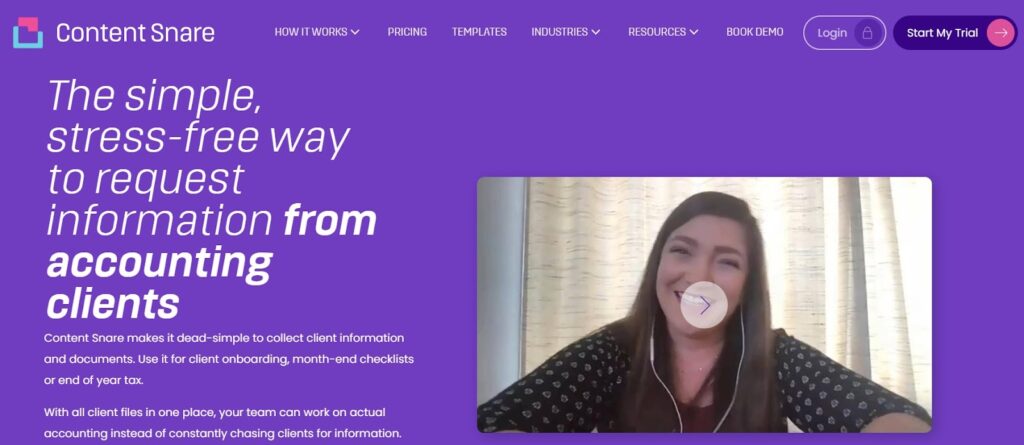Working as a CPA was tough in the pre-Internet era. Even the best and most efficient accountants used to spend hours every day doing repetitive manual tasks that left little room for strategic analysis or client interactions.
But you’re lucky to live in the age of accounting automation software.
Today, accounting firms looking for ways to automate their practice have plenty of options to choose from. We interviewed some of the industry’s most notable names to learn about their favorite accounting software.
But before we get to that, let’s answer a simple question.
What is accounting automation? Definition and benefits

Accounting automation refers to the use of technology to streamline accounting processes, so you can drastically reduce (or even eliminate) repetitive manual tasks. The deployment of automation software has numerous benefits for accounting firms:
1. It’s a time saver
All of our interviewees agree that accounting automation saves a lot of time. That’s because the system takes over many manual tasks like:
- Data entry
- Bank reconciliation
- Report generation
- Payments
- Information and document gathering
This helps CPAs focus on more value-added activities like financial analysis, strategy development, or client advisory services.
“The single most important benefit of using automation in my accounting work is that it frees up some of my brain capacity so that I focus on other people focused projects like training my team or meeting with clients or planning a virtual conference to teach other accounting professionals how to run a virtual firm” — Nayo Carter-Gray, 1st Step Accounting
2. Accuracy
Businesses that automate accounting processes eliminate a range of tedious and repetitive tasks. This leads to a much greater accuracy in financial reporting, which benefits both you and your clients.
“The most crucial benefit of using automation tools is increased productivity, data integrity, and accuracy! When an eCommerce brand has thousands of transactions monthly on multiple sales channels, automation allows that data to be pulled from the sales channels and neatly packaged in the books (with audit details attached). We can confidently tell our clients that their bookkeeping is spot on!” — Danielle Madden, Upscale Bookkeeping
3. Higher efficiency and profitability
Automated accounting software also improves efficiency because it streamlines operations. Automated workflows and standardized procedures make it possible to complete most tasks quicker and more accurately.
This improved efficiency consequently translates into cost savings and higher profitability for accounting practices. What’s best, this kind of accounting system can handle larger volumes of work, which allows you to take on more clients and scale your operations without compromising quality.
“Computers can complete accounting tasks more quickly and more consistently than a human can. I'm always looking for opportunities to automate a process because it unlocks time to serve more clients and generate more revenue. Automated processes also provide a more consistent deliverable to clients, ensuring tasks get done and increasing client retention.” — Christian Putnam, Augur CPA
4. Improved client experience

Accounting automation also improves the overall client experience. With automation software, it’s possible to provide real-time financial data and reports. That way, your clients have a clear and up-to-date view of their financial health. Additionally, the integration of net worth tracking apps further contributes to the effectiveness of financial management.
This level of transparency and accessibility builds trust and strengthens client relationships.
“I am a solopreneur-head chef-dishwasher-lone wolf (ah the serenity). Without automation, I would not be able to service the number of clients at the moment without reducing my sleep hours or compromising on quality. In addition to increased productivity, it does provide a better experience for the client.” — Neil Radford, Neil Radford Accountant & Business Adviser
5. It minimizes human errors
Manual data entry and calculations are prone to human errors. Misplaced decimal points, transcription errors, or miscalculations lead to inaccuracies in financial statements and other documents.
The automation of accounting processes minimizes the risk of human errors. In addition, automation software often includes built-in error detection mechanisms, flagging potential discrepancies and anomalies for further review by accountants.
“By leveraging automation tools, we have been able to streamline and expedite our processes, allowing us to accomplish more in less time. This frees up our team to focus on more strategic and value-added activities. And beyond streamlining processes, automated processes significantly reduce the likelihood of human error which can destroy productivity. Automation has allowed our firm to quickly grow without needing to hire more staff all while maintaining exceptional service to our clients.”
— Nate Coughran, Cookie Finance
The best accounting automation software

Automation platforms can help you eliminate time-consuming tasks like manual data entry, but they come in different forms and focus on different areas of accounting. In this section, we’ll breeze through some of the best tools in five areas.
1. Client relationships and onboarding

Building successful client relationships is the lifeblood of every accounting practice. With modern automation tools, accountants can streamline the onboarding process to improve communication and collaboration.
Expert recommendations: Content Snare
“To collect crucial client information, we have found Content Snare to be the most user-friendly and intuitive platform available. Its easy-to-use interface and intuitive design have transformed the way we gather and organize important data, enabling us to stay ahead of deadlines and deliver exceptional results.” — Nate Coughran, Cookie Finance
“We've automated the customer onboarding process, as well as the sending of notifications related to important changes within a customer's account.” — James Graham, Zamp
2. Accounting process automation
Workflow automation empowers you to work smarter, not harder. By automating repetitive tasks, such as data entry, reconciliation, and report generation, you can save valuable time and redirect focus towards higher-value activities.
Expert recommendations: Our interviewees have many automation suggestions in this area, including Xero, QBO, Zapier, and FYI
“QuickBooks integrates with many third-party software through native and Zapier/Make integrations. These integrations input data into QuickBooks based on triggering events in third-party software.” — Christian Putnam, Augur CPA
“Our main hub is now FYI — so we are trying to get everything we can to talk to FYI so it can feed data back to XPM which is our CRM system. A lot of things being done in the background have made us more reliable and professional. ” — Jodi Porteous, Northwest Accountancy
3. Tax planning
Tax planning is a critical aspect of financial management for individuals and businesses alike. With the aid of automation software, you can perform sophisticated tax calculations, stay updated on changing tax regulations, and devise comprehensive tax strategies.
Expert recommendations: Tax Planner Pro, Corvee
“We have automated the tax planning process by connecting QuickBooks Online to Tax Planner Pro. This tool automatically enters up to date information about our monthly accounting clients making the planning process a whole lot smoother.” — Nayo Carter-Gray, 1st Step Accounting
4. Bookkeeping
Bookkeeping automation allows you to maintain accurate financial records, automate transaction categorization, and generate detailed financial statements effortlessly. This streamlined approach promotes financial clarity and facilitates strategic decision-making.
The best thing is that you can choose from many top-level tools for expense tracking and invoicing.
Expert recommendations: Bookkeep, A2X, Expensify
“We use tools such as A2X, Bookkeep, and PayTraQer to automatically pull data from our client's sales channels into the bookkeeping software. We also use automation to streamline sales tax tracking, filing, and remitting. We use Avalara and Davos for those clients using Bookkeep.” — Danielle Madden, Upscale Bookkeeping
“Weekly bookkeeping — recurring tasks within ClickUp to track completion of weekly tasks, push transactions from Stripe, PayPal, Shopify, and Amazon using Synder.”
— Christian Putnam, Augur CPA
5. Scheduling
Managing busy calendars is a pain in the a** for accountants juggling multiple clients and deadlines. Scheduling automation tools come to the rescue because they simplify the booking process and optimize time management.
Expert recommendations: Calendly, Appointy
“From the very first interaction, we have integrated tools to optimize efficiency. Clients can conveniently book appointments directly on our website using Calendly, which integrates with our Google email and Zoom for effortless scheduling.” — Nate Coughran, Cookie Finance
Challenges of automating your accounting system

Accounting automation tools give you countless benefits, but they also come with their own set of challenges — just like any tech innovation. Here are some of the biggest drawbacks:
1. Third-party integrations
The key challenge is to integrate multiple software systems within your organization. Your business accounting automation software needs to communicate seamlessly with other platforms, but it’s often difficult to ensure smooth data flow between different platforms.
“Software integrations are key to automating an accounting process. It's always frustrating when I'm not able to take data from one system and put it into another system. When considering a new accounting software I always review the software's list of third-party integrations to confirm that data can be automatically imported into, manipulated within, and exported from the software.”
— Christian Putnam, Augur CPA
2. Time investments
While automation can save time in the long run, the initial implementation requires a significant time investment. Training your team to use the new automated tools effectively and adapting to the new processes may slow down operations in the early stages of deployment.
“The biggest speed bump when using automation is the initial investment of time to have it configured properly to allow for optimal use.” — Neil Radford, Neil Radford Accountant & Business Adviser
3. Customization issues
No two businesses are identical, and their accounting processes often reflect their unique requirements.
Off-the-shelf automated accounting software probably can’t address all of your specific needs. Customizing the automation to match your business processes can be a challenging task, requiring expert guidance and development resources.
“A critical aspect of our strategy is ensuring a seamless integration between our automation tools and existing accounting systems. We only sign up for tools that we know will speak to our other systems. This has created a cohesive ecosystem that increases our efficiency and minimizes manual data entry.”
— Nate Coughran, Cookie Finance
4. Testing the process
Many users pose a simple question: Will automated accounting software deliver as planned?
It’s a logical concern because relying heavily on automated processes means that any errors or bugs in the system can have significant consequences. Rigorous testing of your automated accounting system is mandatory to ensure smooth deployment.
“The only challenge when using automation tools is testing the end result. I used to try and test these tools using a live data file but now I have a paid QBO account that I use to run tests on what the final results of the automation will be to ensure it meets my needs.”
— Nayo Carter-Gray, 1st Step Accounting
5. Security and compliance
Automating accounting processes involves handling sensitive financial data, so you’ll have to ensure the security and privacy of financial reports and other client-related information. And it’s not a one-sided process, as you’ll also have to comply with rigorous industry regulations and third-party procedures.
“The security features of banks are making tools such as LedgerSync & Dext increasingly difficult to use.” — Timothy Raines, Patrick & Raines, CPAs
Streamline client communication with Content Snare
Automation tools have become indispensable assets for streamlining business operations, especially in accounting. With these platforms, CPAs and accounting firms significantly improve their efficiency and accuracy.
But every project starts with seamless client communication and onboarding, so you’ll need a tool like Content Snare to make it work. Our platform supplements your automated accounting system with a range of advanced features:
- Customizable form and questionnaire templates
- Automated data collection reminders
- Pre-filling
- Auto-saving feature
- Bank-grade security
Content Snare will make your accounting system user-friendlier, so you can quickly seal deals and retain clients. Read to give it a try?



